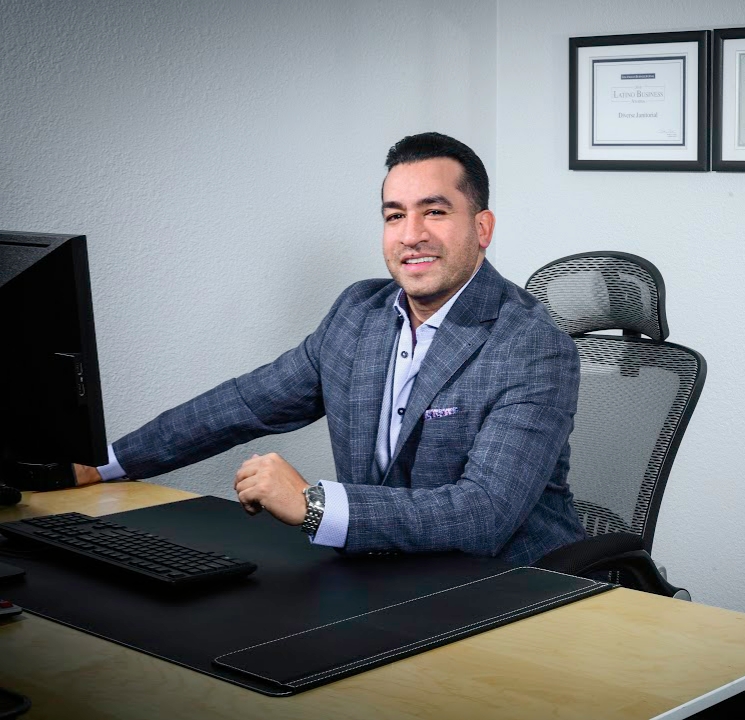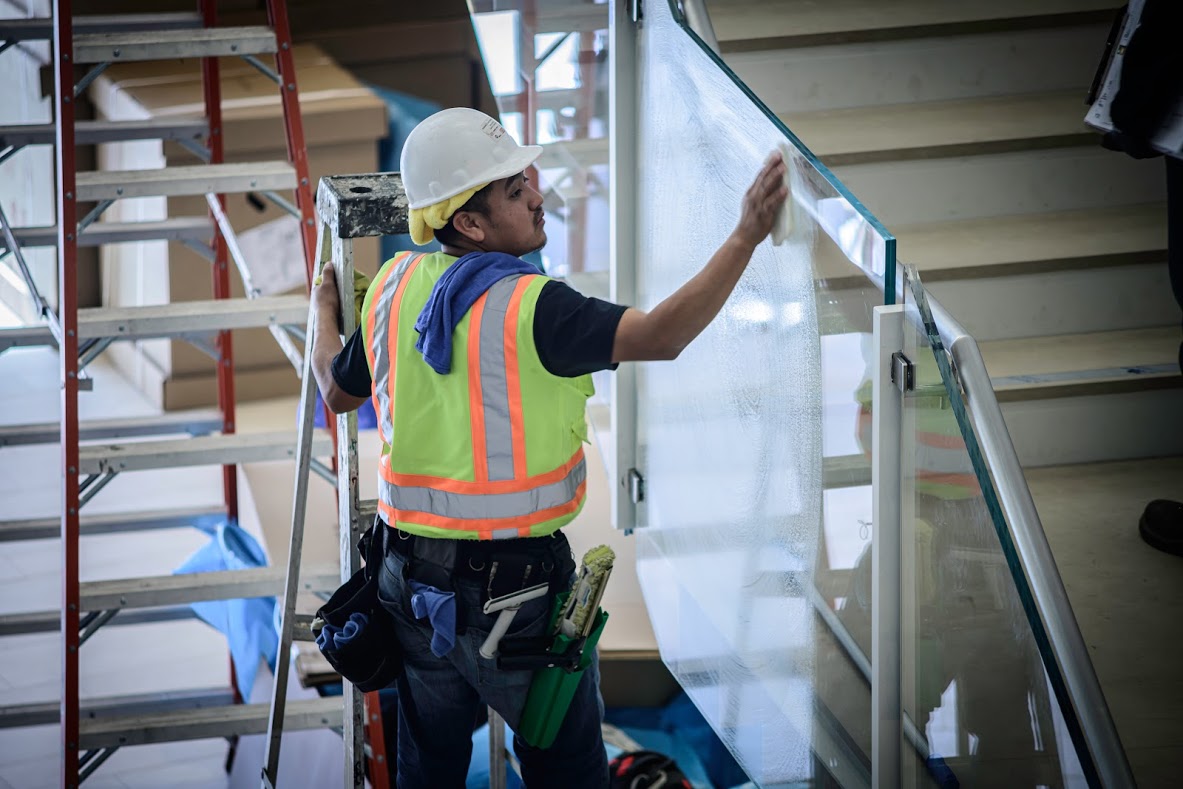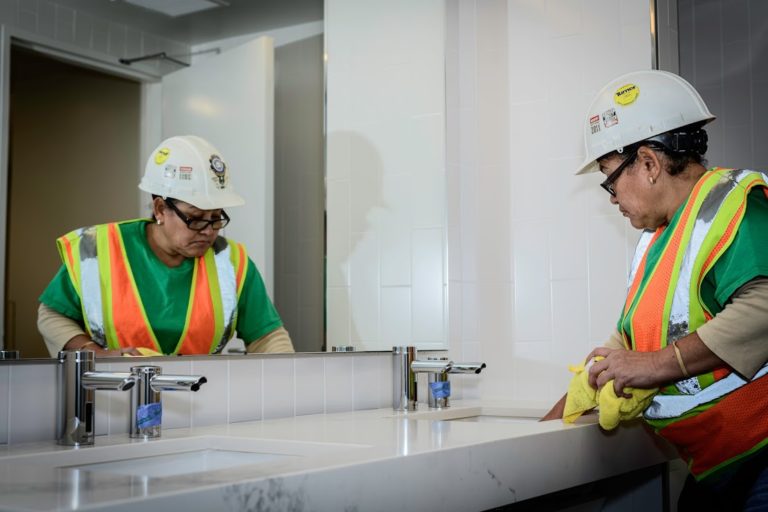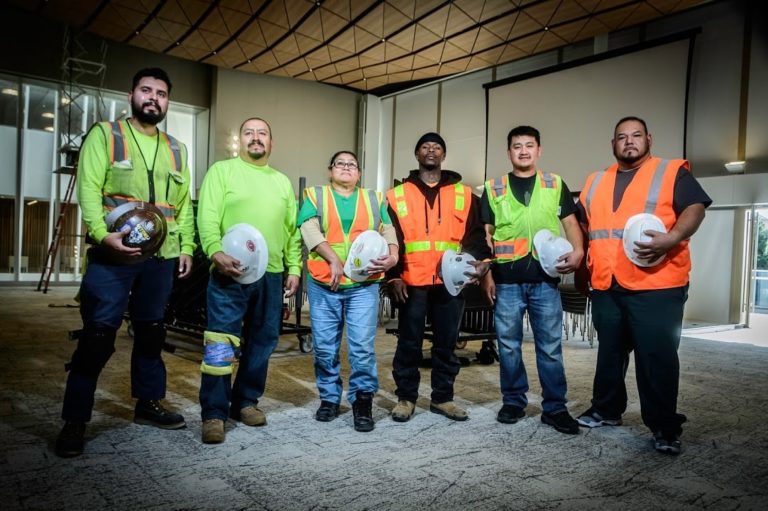In the Press

Roland Cordero, Owner and CEO, Coast 2 Coast Preservations, Inc., DBA Diverse Janitorial
as well. Based on his life experiences, he firmly believed in paying his workers a fair living wage; this, however, made it impossible to compete with the many private sector companies whose bids came in much lower than his because they paid their “casual” labor only $10 per hour, cash. Fortuitously, a friend of his worked as a painting contractor in the public works sector, where contractors are required to pay prevailing wage; as Roland’s friend explained, this means that everyone has to pay their employees at least that same required hourly rate, which eliminates having to compete against unfairly low bids that are based on exploiting laborers.

A Member of the Diverse Janitorial crew at UCLA’s Anderson School of Management Addition, completing a contract awarded by PCL
With his sights now set on the public sector, Roland started attending contractor outreach events, such as a Los Angeles Community College District small business bootcamp about college renovation and remodeling projects. Although Roland got certified as a Minority Business Enterprise (MBE), Disadvantaged Business Enterprise (DBE) and Small Business Enterprise (SBE) and started submitting bids with several general contractors, he was not being awarded contracts because he had no large-scale project experience, and did not yet understand how to accurately estimate costs, figure out his profit margin and submit a competitive bid. “One of my biggest challenges is that I’d had no education about how to effectively run a business and had no hands-on experience in this arena,” he recalls, “so there were a number of missing pieces that I had to pursue before I was ready for the public sector.” While he could have become discouraged, especially when his mother passed away around this time, Roland kept in mind her admonishments to “never give up,” and continued
educating himself, networking and building relationships, which eventually led to his first serious opportunity.
“I would regularly see Giovanna Brasfield, Manager of Outreach and Diversity for Hensel Phelps, at various events. When I told her that I wanted to bid to provide cleaning services on a Southwest Community College project, she introduced me to Hensel Phelps Project Manager, Robert Cruz,” says Roland, “Robert took the time to listen to my pitch, learn more about my company, and provide encouragement and advice. He said that while he could see that I was a go-getter and that it was great that I had gotten my business certified, I also needed to get some hands-on experience.” Taking this advice to heart, Roland went after his first large-scale project – spending the next 6 months cleaning 300 downtown Los Angeles apartments for a private company. Although he made a number of mistakes which led to his underbidding the contract, he successfully saw the project through to completion, learning a great deal in the process. “The knowledge and experience I gained allowed me to go back and bid on a project for Robert at Hensel Phelps.”
Roland will always be grateful to Robert Cruz and the Hensel Phelps team for guiding him through the submission of his first public works bid. “They really went the extra mile to go through and clarify the engineering plans with me so that I could adjust my calculations, because I had misread some of the measurements,” he notes, “They didn’t have to do that, but because we had developed a positive relationship and they knew I was earnest and motivated, they were willing to mentor me.” Diverse Janitorial’s first public works contract ran for 4 months and provided construction clean-up services for Hensel Phelps’ LA Metro Division 16 Southwest Yard Projects. “My team did a great job. Robert was very happy with the results, and I felt very proud to have completed my first public works project.”
At a local contractor outreach event, Roland met Rosa Osorio, Account Manager at Merriwether & Williams Insurance Services, administrators of several regional Contractor Development and

A Member of the Diverse Janitorial crew at UCLA’s Anderson School of Management Addition, completing a contract awarded by PCL
Bonding Programs, which provide free technical support and training for underrepresented contractors interested in public sector projects. Through the Contractor Development and Bonding Program, as well as other industry workshops, such as the Clark Strategic Partnership Program, Roland’s business skills and acumen continued to grow. “I took courses in financial and project management, cost estimating, business administration, prevailing wage and many other topics that are vital to successfully running a business.” A proud graduate of the Goldman Sachs 10,000 Small Businesses Program, Roland created a 5-year business plan and learned how to use niche services to distinguish himself from his competitors. After an individualized business assessment, Rosa referred Roland to an insurance partner, Lourdes Landa at BB&T Insurance Services, who explained some of the credit issues that were preventing him from being eligible for bonding.
“Learning how to repair my credit, as well as how to read and understand financial reports helped me identify mistakes I’d been making,” explains Roland. Because having good credit and accurate financial and business record-keeping are essential, especially when applying for bonding or a business loan, correcting these enabled Roland to return to Lourdes, who helped secure $350,000 in initial bonding for Roland’s company, which was doing business as Diverse Janitorial. “There are some large contractors who don’t require bonding, but most of them do,” says Roland. In turn, Lourdes referred him to business banker Wendy Gray, at Pacific Western Bank, where after initially being denied, he was eventually approved for a business line of credit, useful for meeting payroll and floating expenses.

Members of the Diverse Janitorial crew, on-site at UCLA’s Anderson School of Management Addition.
Diverse Janitorial was awarded a second contract with Hensel Phelps, to provide services for LAX American Airlines Terminals 4 and 5. The company was approved for a second business line of credit through Banner Bank, and its bonding capacity was increased to $500,000. With each successfully completed project, more opportunities presented themselves. “You have to be willing to start on smaller projects first, to show the Primes what you can do,” advises Roland, who points to PCL Construction Services as another proactive general contractor and to their Manager of Diversity and Inclusion, Priscilla Chavez, as an ally for small contractors within the industry. “They started us out with a small cleaning contract at LAX, then gave us sequentially larger projects. A week ago, we finished completing an over 6-figure cleaning contract for them at UCLA’s Anderson School of Management Addition.” Diverse Janitorial is currently working on the new Kaiser Claremont Hospital in San Diego, Grossman College in El Cajon, UC Riverside, San Diego Airport and is applying to increase their bonding capacity to
$1.5 Million.
Acknowledging the additional socio-economic challenges he’s faced as a minority, Roland is deeply appreciative of the many outreach efforts, advocates, inclusion programs and individual mentors that have helped him get to where he is now. “First, I want to thank God for all his blessings, my mom, dad and family for supporting my dreams, my business mentors for guiding me throughout my career, Robert Tirado for helping me make great financial decisions, all the friends who have helped in my journey, my insurance brokers, my CPA, my business banker, my clients for trusting in our company, and especially our hard-working employees. It takes a great team to reach success!”
Roland’s goal is to pay it forward by becoming one of the largest commercial and construction clean-up companies in the nation, not only because he loves a good challenge but because he wants to help other underrepresented groups achieve economic success and a higher standard of living. “I love having a conscious business actively creating opportunities for other minorities,” he states, “There are a lot of stereotypes out there still to be debunked and it is incredibly rewarding to be able to hire people at a livable wage that helps them put food on the table and support their families.”
